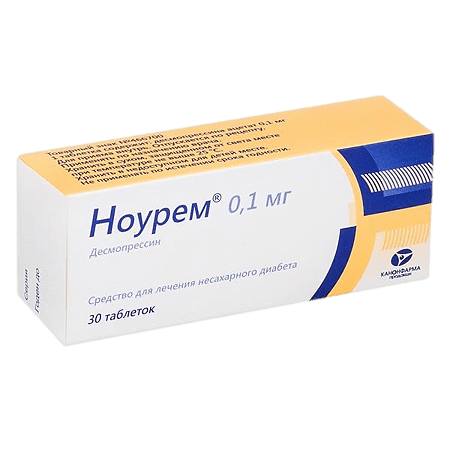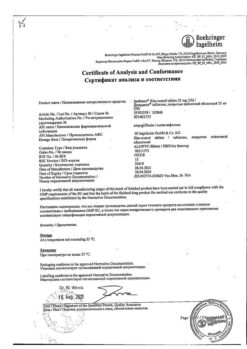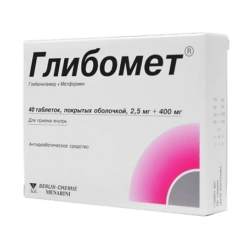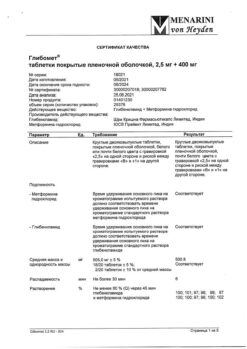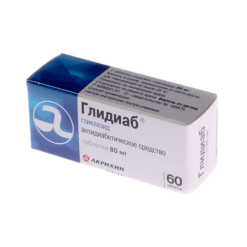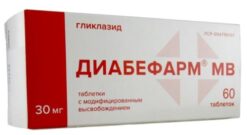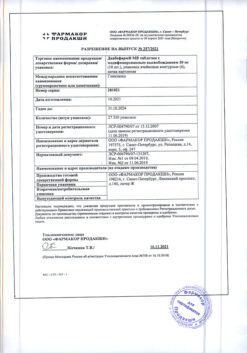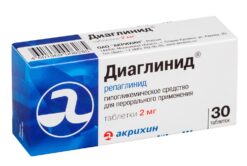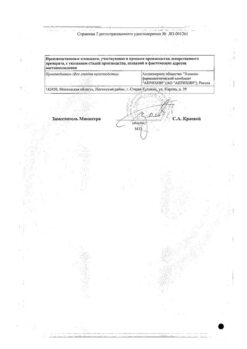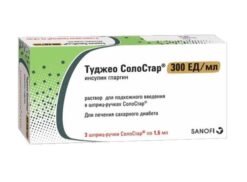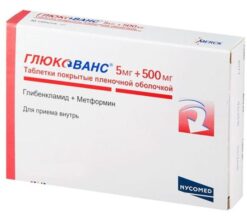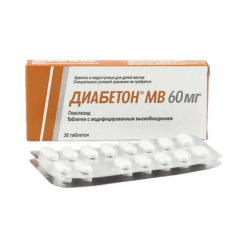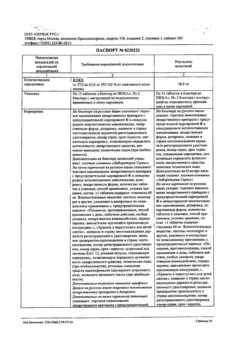No products in the cart.
Description
Nourem® contains desmopressin, a structural analogue of the natural hormone arginine-vasopressin. Desmopressin is obtained as a result of changes in the structure of the vasopressin molecule – deamination of I-cysteine and substitution of 8-L-arginine for 8-D-arginine.
These structural changes lead in combination with a significantly enhanced antidiuretic ability to a less pronounced effect on vascular smooth muscle and internal organs compared to vasopressin, resulting in no unwanted spastic side effects.
Unlike vasopressin it has a more sustained effect and does not cause increase in BP. The drug increases permeability of epithelium of distal tubules of nephron for water and increases its reabsorption. Administration of Nourem® leads to decrease of urine volume and simultaneous increase of urine osmolarity and decrease of blood plasma osmolarity.
This results in decreased frequency of urination and decreased nocturnal polyuria. After oral administration the antidiuretic effect occurs within 15 minutes.
The maximum antidiuretic effect occurs after 4-7 hours after oral administration. Antidiuretic effect when administered orally in dose 0.1-0.2 mg – up to 8 hours, in dose 0.4 mg – up to 12 hours.
Indications
Indications
Diabetes insipidus of central origin;
primary nocturnal enuresis in children over 5 years of age;
nocturnal polyuria in adults (as symptomatic therapy).
Pharmacological effect
Pharmacological effect
The drug Nourem® contains desmopressin, a structural analogue of the natural hormone arginine vasopressin. Desmopressin was obtained as a result of changes in the structure of the vasopressin molecule – deamination of I-cysteine and replacement of 8-L-arginine with 8-D-arginine.
These structural changes, combined with a significantly enhanced antidiuretic ability, lead to a less pronounced effect on the smooth muscles of blood vessels and internal organs compared to vasopressin, which results in the absence of unwanted spastic side effects.
Unlike vasopressin, it acts longer and does not cause an increase in blood pressure. The drug increases the permeability of the epithelium of the distal convoluted tubules of the nephron to water and increases its reabsorption. The use of the drug Nourem® leads to a decrease in the volume of urine excreted and a simultaneous increase in urine osmolarity and a decrease in blood plasma osmolarity.
This leads to a decrease in the frequency of urination and a decrease in nighttime polyurin. After oral administration, the antidiuregic effect occurs within 15 minutes.
The maximum antidiuretic effect occurs when taken orally after 4-7 hours. Antidiuretic effect when taken orally at a dose of 0.1-0.2 mg – up to 8 hours, at a dose of 0.4 mg – up to 12 hours.
Special instructions
Special instructions
To avoid the development of side effects, it is necessary to limit fluid intake to a minimum 1 hour before taking the drug and for 8 hours after taking the drug in patients with primary nocturnal enuresis. Failure to comply with this rule leads to the development of side effects.
Clinical studies have shown that hyponatremia most often occurs in elderly patients (65 years and older). Elderly patients with an initially low sodium concentration in the blood plasma and polyuria from 2.8 to 3.0 liters have a high risk of developing side effects.
Desmopressin should not be used in cases where there are other additional causes for fluid retention and electrolyte disturbances.
Prevention of the development of hyponatremia consists of increasing the frequency of determination of sodium in the blood plasma, especially in cases of simultaneous use with drugs that cause the syndrome of inappropriate secretion of antidiuretic hormone (tricyclic antidepressants, selective serotonin inhibitors, chlorpromazine and carbamazepine) and NSAIDs.
In cases of acute urinary incontinence, dysuria and/or nocturia, urinary tract infection, suspected bladder or prostate tumor, polydipsia and decompensated diabetes mellitus, diagnosis and treatment of these conditions and diseases should be carried out before starting treatment with desmopressin.
If systemic infections, fever, or gastroenteritis develop during treatment, the drug should be discontinued.
Impact on the ability to drive vehicles and machinery
Currently, there is no data on the possible effect of desmopressin on the ability to drive vehicles and operate machinery.
However, the use of Nourem® may lead to the development of side effects such as dizziness and headache, which can negatively affect the ability to drive vehicles and perform potentially hazardous activities that require increased concentration and speed of psychomotor reactions.
It is recommended to be careful when operating vehicles and machinery.
Active ingredient
Active ingredient
Desmopressin
Composition
Composition
1 tablet contains:
active substance:
desmopressin acetate 0.1 mg (as trihydrate 0.105 mg), equivalent to desmopressin 0.089 mg;
excipients:
pregelatinized corn starch 35.3 mg,
sodium carboxymethyl starch 3 mg,
mannitol 62 mg,
magnesium stearate 0.6 mg,
microcrystalline cellulose 19 mg.
Contraindications
Contraindications
Hypersensitivity to desmopressin or other components of the drug;
habitual or psychogenic polydipsia;
heart failure and other conditions requiring the use of diuretics;
hyponatremia, including a history (the concentration of sodium ions in the blood plasma is below 135 mmol/l);
renal failure of moderate and severe severity (creatinine clearance (CC) below 50 ml/min);
syndrome of inadequate production of antidiuretic hormone.
children up to 4 years of age (for the treatment of diabetes insipidus) and 5 years of age (for the treatment of primary nocturnal enuresis).
With caution
The drug should be used with caution in chronic renal failure (creatinine clearance more than 50 ml/min), bladder fibrosis, water-electrolyte imbalance, potential risk of increased intracranial pressure, during pregnancy, as well as in patients with diseases of the cardiovascular system, with a history of bronchial asthma, epilepsy and migraine (if necessary, reduce the dose of the drug).
The drug is prescribed with extreme caution to elderly patients (65 years and older) due to the high risk of side effects (including fluid retention, hyponatremia). If the decision to treat with desmopressin is made, then before prescription, 3 days after the start of treatment and with each dose increase, it is necessary to determine the concentration of sodium in the blood plasma and monitor the patient’s condition.
Side Effects
Side Effects
From the central nervous system: headache, dizziness.
From the digestive system: nausea, vomiting, dry mouth.
Other: scleral hyperemia, hot flashes, transient tachyarrhythmia, convulsions.
Taking desmopressin without simultaneous restriction of fluid intake can lead to fluid retention in the body, accompanied by hyponatremia, weight gain, peripheral edema, and, in severe cases, seizures.
When used simultaneously with imipramine or oxybutynin, hyponatremic convulsions are possible.
Interaction
Interaction
With simultaneous use, desmopressin enhances the effect of hypertensive drugs. When used simultaneously, buformin, tetracycline, lithium preparations, and norepinephrine weaken the antidiuretic effect of desmopressin.
When desmopressin is used concomitantly with non-steroidal anti-inflammatory drugs (NSAIDs), the risk of side effects may increase. With simultaneous use, indomethacin enhances, but does not prolong the duration of action of desmopressin.
When used concomitantly, tricyclic antidepressants, selective serotonin reuptake inhibitors, narcotic analgesics, NSAIDs, lamotrigine, chlorpromazine and carbamazepine, which can cause syndrome of inappropriate antidiuretic hormone secretion, may enhance the antidiuretic effect of desmopressin and lead to an increased risk of fluid retention and hyponatremia.
When using desmopressin with loperamide, a threefold increase in the concentration of desmopressin in plasma is possible, which significantly increases the risk of fluid retention and the occurrence of hyponatremia. It is possible that other drugs that slow peristalsis may have a similar effect.
With simultaneous use of desmopressin with dimethicone, the absorption of desmopressin may be reduced.
Overdose
Overdose
Overdose leads to an increase in the duration of action of desmopressin and an increased risk of fluid retention and hyponatremia. Treatment of hyponatremia should be individualized; discontinuation of the drug and lifting of fluid intake restrictions are mandatory.
If there are symptoms of overdose, infusion of 0.9% or hypertonic sodium chloride solution is possible. In case of severe fluid retention (convulsions and loss of consciousness), furosemide should be added to therapy.
In case of overdose, consult a doctor.
Manufacturer
Manufacturer
Kanonpharma production CJSC, Russia
Additional information
| Manufacturer | Kanonfarma Production ZAO, Russia |
|---|---|
| Medication form | pills |
| Brand | Kanonfarma Production ZAO |
Related products
Buy Nourem, tablets 0,1 mg 30 pcs with delivery to USA, UK, Europe and over 120 other countries.

